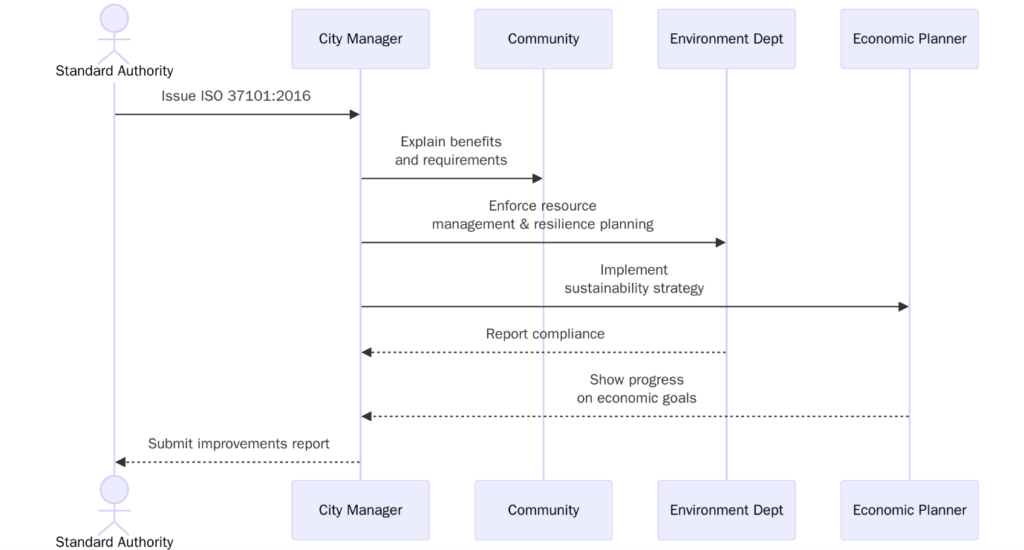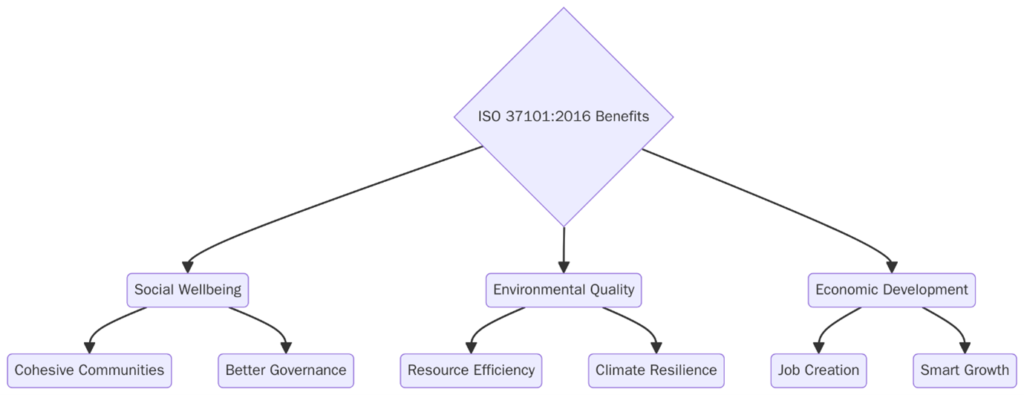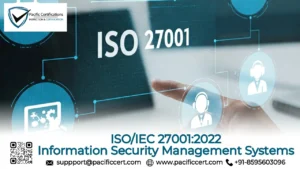What is ISO 37101?
ISO 37101:2016 is the international standard that defines the requirements for a management system to guide communities toward sustainable development. It helps cities, municipalities, and other administrative bodies to plan and implement strategies that support long-term environmental health and economic viability.

The standard aims to make communities more resilient and sustainable by embedding sustainability principles into public policy, planning, and operational practices. ISO 37101 integrates six sustainable development goals, resilience, inclusiveness, attractiveness, preservation of the environment, responsible resource use, and social cohesion, into a structured management system approach.
Looking to implement ISO 37101 for your municipality or development agency? Contact us at support@pacificcert.com!
Scope and Applicability
ISO 37101 applies to all types of communities, urban, rural, developed, or developing, regardless of size, geography, or governance model. It is suitable for:
- Local governments and municipal authorities
- Urban planning bodies
- Public-private partnerships (PPPs)
- NGOs and sustainability-focused community organizations
- Consultants supporting community development
The standard provides guidance for creating long-term plans, managing stakeholder engagement, improving infrastructure sustainability, and responding effectively to social and environmental challenges.
To understand how ISO 37101 can be tailored for your region, email support@pacificcert.com or dial 91-8595603096.
Certification Process
ISO 37101 is a certifiable standard, meaning communities and their governing bodies can undergo third-party certification to validate their sustainability management systems.
Certification steps:
- Baseline Assessment – Review existing sustainability goals, governance structures, and stakeholder practices.
- Planning – Define sustainable development objectives in alignment with ISO 37101’s six areas.
- System Design – Develop documentation, assign responsibilities, and implement sustainability practices.
- Implementation – Engage stakeholders, monitor progress, and embed practices into core operations.
- Internal Audit and Review – Ensure the system performs as intended before certification.
- Third-Party Audit – A certification body such as Pacific Certifications evaluates compliance and issues the certificate.
We provide complete certification support including audit and certification. For guidance, contact support@pacificcert.com.
How to Implement ISO 37101 in Your Organization?
Implementation begins by understanding the needs and expectations of the community. This includes identifying sustainability challenges such as climate risks or social inequality. Stakeholder engagement is key, from government agencies to civil society, private sector, and residents.
Once the baseline is established:
- Define community-specific sustainability objectives based on the standard’s six core outcomes.
- Develop a sustainability management system aligned with existing planning, budgeting, and policy processes.
- Create an implementation roadmap, assign roles, and establish performance indicators.
- Integrate the system into procurement, urban planning, and community service delivery functions.
Pacific Certifications can assist in every phase of certification, reach us at support@pacificcert.com!
Documentation Required for ISO 37101
To meet ISO 37101 certification requirements, the following documents are typically required:
- Sustainability management policy and objectives
- Community profile and risk assessments
- Stakeholder engagement plans and records
- Strategic action plans and implementation frameworks
- Legal and regulatory compliance documentation
- Performance monitoring and evaluation reports
- Internal audit and management review records
Need help with the certification process? Contact support@pacificcert.com and get support.
Eligibility Criteria
Any public or private body involved in community governance or development is eligible to implement ISO 37101. This includes:
- Municipal or city governments
- State or regional planning bodies
- NGOs and multilateral development programs
- Organizations managing infrastructure, utilities, or public services
- Public-private partnerships focused on urban development
Entities must demonstrate a commitment to sustainable development and the ability to manage stakeholder input, risk, and performance improvement.
Not sure if your organization qualifies? Get in touch at support@pacificcert.com!
Certification Costs of ISO 37101
Costs for ISO 37101 certification vary based on:
- Population and geographical size of the community
- Number of departments or organizations involved
- Existing sustainability practices and documentation
- Customization needs and integration with other standards (ISO 9001, ISO 14001)
- Desired timeline and staff training needs
We offer transparent pricing based on your scope and readiness. For a quote, contact support@pacificcert.com!
Certification Timeline
Week | Activities |
Week 1 | Initial assessment, community profile review, and stakeholder mapping |
Week 2 | Define sustainability objectives and develop action plans |
Week 3 | Documentation development and system integration |
Week 4 | Staff training and stakeholder engagement |
Week 5 | Internal audit and performance measurement setup |
Week 6 | Third-party audit and corrective action closure |
Want help managing your certification timeline? Reach out to support@pacificcert.com.
Requirements of ISO 37101
ISO 37101 outlines a structured set of requirements that cover:

- Understanding the Community Context – Conducting assessments of demographic, environmental, economic, and governance factors
- Leadership and Accountability – Establishing top-level commitment and defining clear responsibilities
- Strategic Planning and Objectives – Aligning sustainability goals with governance, infrastructure, and development plans
- Stakeholder Engagement – Facilitating inclusive, transparent, and participatory dialogue
- Operational Control – Implementing policies, projects, and resource allocation that support sustainability outcomes
- Performance Monitoring – Using metrics and KPIs to track progress and guide improvements
- Continual Improvement – Periodically reviewing strategies, policies, and performance for refinement
We help translate these requirements into actionable, community-specific systems. Contact us at support@pacificcert.com to begin!
What are the Benefits of ISO 37101?
- Equips communities to withstand environmental, social, and economic shocks by embedding long-term sustainability into decision-making.
- Encourages participation from all stakeholders, ensuring the community’s diverse voices influence planning and implementation.
- Supports eligibility for international funding and investment programs by demonstrating compliance with recognized sustainability standards.
- Establishes clear roles, responsibilities, and reporting mechanisms, enhancing trust and transparency.
- Helps communities contribute directly to SDGs such as clean energy, climate action, and sustainable cities.
- Integrates environmental and efficiency criteria into infrastructure planning and procurement.
- Bridges silos between departments and harmonizes sustainability strategies across local services.
- Facilitates eco-innovation, green jobs, and sustainable entrepreneurship by creating an enabling policy environment.

ISO 37101 is gaining adoption among cities and communities aiming to align local planning with global sustainability frameworks. With over 80% of the world’s population projected to live in urban areas by 2050 (UN Habitat), the need for structured community development systems is urgent.
Smart city initiatives and climate adaptation programs globally are increasingly referencing ISO 37101 as a framework for design and monitoring. Funding bodies such as the World Bank, UNDP, and regional development banks often support ISO-aligned initiatives for better accountability and impact tracking.
The standard’s integration with SDGs, climate action goals, and stakeholder engagement processes makes it a core tool for sustainable urban and rural planning.
Want to position your community as a leader in sustainability? Email support@pacificcert.com!
How Pacific Certifications Can Help?
We at Pacific Certifications offer:
- ISO 37101 readiness assessments and baseline reviews
- Audit and certification
- Certification issuance
- Surveillance audits
- Continual improvement
Our team has worked with governments, townships, and community-based organizations to embed long-term sustainability through ISO 37101. Let’s begin your sustainable development journey, contact us at support@pacificcert.com!
FAQ on ISO 37101
Is ISO 37101 a certifiable standard?
Yes, communities and organizations can undergo third-party certification.
Is the standard suitable for small towns or rural areas?
Absolutely. ISO 37101 is scalable to all community sizes.
Can it be integrated with other ISO standards?
Yes, it aligns well with ISO 9001, ISO 14001, and ISO 26000.
How long does certification take?
Typically 6–12 weeks, depending on size and existing systems.
Is stakeholder engagement mandatory?
Yes, inclusive governance and stakeholder input are core elements.
Ready to get ISO 37101 certified?
Contact Pacific Certifications to begin your certification journey today!
Suggested Certifications –
Read more: Pacific Blogs






